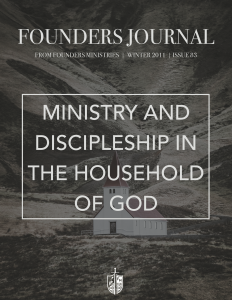The English Puritans were a 16th and 17th century movement that sought to purify the Church of England in worship and doctrine. They were the outgrowth of the Protestant Reformation and they heavily influenced the later development of Christianity in North America. The Puritans were Reformed and emphasized the necessity of spiritual conversation. The Puritans placed a special emphasis on the transforming work of the Holy Spirit in salvation which strongly influenced modern Evangelicalism.
Contemporary Evangelicals are beginning to look once again to the Puritans for their robust theology. [1] What is not so widely known about the Puritans is their emphasis on discipleship and how that can speak today in the 21st century.
J. I. Packer says, “The Puritans were robust in their view of life. To be a Puritan was to look forward to the glory that is to come and to prepare for a good death — that would be the last act of a life of good and faithful discipleship.” [2] Here are a few ways that the Puritans made gospel centered disciples.
Biblical Preaching
Ivonwy Morgan said, “The essential thing in understanding the Puritans was that they were preachers before they were anything else . What bound them together, undergirded their striving, and gave them the dynamic to persist was their consciousness that they were called to preach the Gospel.” [3] The Puritan era produced some of the greatest preachers England has even known. [4] Men such as William Perkins (1558-1602), Richard Baxter (1615-1691), Richard Sibbes (1577-1635) and John Owen (1616-1683) were theological giants as well as great biblical preachers.
The Puritan pastor played an important role in discipleship of believers through preaching and personally catechizing the flock. [5] One of the primary reasons Puritans were great preachers is because they were men of prayer who loved the Bible. [6] Their sermons were biblically grounded and saturated with doctrine and devotion to the risen Christ. [7] J. I. Packer offers the following marks of Puritan preaching:
1. Expository in its method
2. Doctrinal in its content
3. Orderly in its arrangement
4. Popular in its style
5. Christ centered in its orientation
6. Experimental in its interests
7. Piercing in its application
8. Powerful in its manner [8]
The Puritans took the sermon beyond the pulpit on Sunday morning. Men, women, boys and girls were all expected to hear, discuss and apply the sermon to their everyday lives. Families were encouraged to discuss the sermon around the dinner table and at home throughout the week. Erroll Hulse said, “Heads of families should make sure that the sermon materials are retained. Encourage lively discussion and repletion of the main heads of the exposition at meal table.” [9] In a similar way, Mark Dever says, “They realized that in preaching their sermons well they would be educating the church. That’s why they would encourage families to rehearse the sermons at the dinner table.” [10] By encouraging families to discuss the sermon each week discipleship was extended from the pulpit to the home. Families played an important role in discussing the sermon in informal small groups.
Devotional Writing
Packer says, “Puritan pastors insisted that part of being a good Christian was to read Puritan devotional books, and so a common literature bound the constituency together.” [11] The Puritans were prolific authors who produced a plethora of devotional books and pamphlets for their followers. William Perkins’ writings totaled over 2,500 pages and were translated into half a dozen languages. John Owen works are collected in 24 volumes, including his large work on the Holy Spirit and his seven-volume commentary on Hebrews. John Bunyan wrote 60 books over a 30 year time period. Richard Baxter also wrote an impressive 1,143 pages on various topics from pastoral ministry to dying well.
Nearly 300 years ago, George Whitefield said, “Though dead, they by their writings yet speak.” [12] Their writings still have power and influence today. Packer passionately reminds us, “The unction continues, the authority is still felt, and the mature wisdom still remains breathtaking, as all modern Puritan-readers soon discover for themselves. Through the legacy of this literature the Puritans can help us today towards the maturity that they knew, and that we need.” [13]
Catechisms and Creeds
The Puritans also used catechisms, creeds and confessions to disciple their flocks. [14] Catechesis is the process of instructing believers both young and old in the basics of the Christian faith. Catechisms provide basic summaries of the church’s teachings to ensure that all members of the church understand the essentials of the faith for themselves. Most catechisms generally have questions and answers accompanied by biblical support and explanations.
The Puritans developed their own catechisms, including the Westminster Larger and Smaller Catechisms in the 1640’s. For many Protestant Christians everywhere, the Westminster Catechisms are the most important and influential of all the Reformed catechisms. These documents were written to provide children, new believers, and church members alike a short but comprehensive summary of the Reformed church’s doctrines.
Puritan pastors encouraged heads of families to catechize family members in their home. Richard Baxter said, “Persuade the master of every family to cause his children and servants to repeat the Catechism to him, every Sabbath evening, and to give him some account of what they have heard at church during the day.” [15] Puritan pastors regularly visited the homes of their flock to catechize families. They believed that the pastor had a personal responsibility to personally catechizing church members. [16]
Keeping the Sabbath Holy
The Puritans are well known for keeping the Sabbath. [17] They believed the Sabbath was a command, not an option. They knew the spiritual significance of keeping the Sabbath day holy. The Westminster Confession described the Sabbath in the following way:
This Sabbath is to be kept holy unto the Lord when men, after a due preparing of their hearts, and ordering of their common affairs beforehand, do not only observe an holy rest all the day from their own works, words, and thoughts about their worldly employments and recreations; but also are taken up the whole time in the public and private exercises of his worship, and in the duties of necessity and mercy [21:8].
The Puritans can teach contemporary Christians a lot about Sabbath rest. Throughout the Bible God promises rest to His people. The biblical word for rest literally means to cease from work. [18] Rest is the reason why God commanded us to keep the Sabbath. Jesus said that the Sabbath was created for man, and not man for the Sabbath. Even doing a good work for the Lord can be a distraction if there is no time to rest. Ministers are burning out at an unbelievable rate. Nearly 90% of pastors feel overworked and 50% of those who go into full-time service drop out in 5 years. [19] Spiritual burnout occurs when pastors don’t give themselves time to rest from their daily routine. Puritans were a great example for spiritual rest because they kept the Sabbath day holy.
The Lord’s day is not for idleness. [20] The Puritan’s observance of the Lord’s Day was not a time of solitary retreat and inactivity; rather it was a time spent doing spiritual work in the company of family. Baxter, said, “Persuade the master of every family to cause his children and servants to repeat the catechism to him, every Sabbath evening, and to give him some account of what they have heard at church the day.” [21]
Family Ministry
Lastly, the Puritans emphasized the value and importance of family ministry. The Christian family was one of the hallmarks of the Puritan era and one of their greatest legacies. [22]
J.I. Packer said of the Puritan family:
“It is hardly too much to say that the Puritans created the Christian family in the English-speaking world. The Puritan ethic of marriage was to look not for a partner whom you do love passionately at this moment, but rather for one whom you can love steadily as your best friend for life, and then to proceed with God’s help to do just that. The Puritan ethic of nurture was to train up children in the way they should go, to care for their bodies and souls together, and to educate them for sober, godly, socially useful adult living.” [23]
The puritan pastor Richard Baxter knew the importance of family ministry. He said:
“We must have a special eye upon families, to see that they are well ordered, and the duties of each relation performed. The life of religion, and the welfare and glory of both the Church and the State, depend much on family government and duty. If we suffer the neglect of this, we shall undo all . I beseech you, therefore, if you desire the reformation and welfare of your people, do all you can to promote family religion.” [24]
The Puritans believed that their home was their church. They knew the call to “make disciples” begins in the home. In his farewell sermon, Jonathan Edwards said, “Every Christian family ought to be as it were a little church, consecrated to Christ, and wholly influenced and governed by his rules. And family education and order are some of the chief means of grace.” [25] Fathers in particular had a spiritual responsibility to pastor their wives and children. Thomas Doo Little said:
“Masters of families ought to read the Scripture to their families and instruct their children and servants in the matters and doctrines of salvation. Therefore, they are to pray in and with their families. No man that will not deny the Scripture can deny the unquestionable duty of reading the Scripture in our houses, governors of families teaching and instructing them out of the Word of God.” [26]
Husbands and wives had a spiritual responsibility to help disciple one another. Richard Baxter spoke of the spiritual duties of husbands and wives toward each other:
One of the most important duties of a husband to his wife and a wife to her husband is to carefully, skillfully, and diligently help each other in the knowledge and worship, and obedience of God that they might be saved and grow in their Christian life . Watching over the hearts and lives of one another, judging the condition of each other’s souls, and the strength or weakness of each others sins and graces, and the failings of each other’s lives, so that you may be able to apply to one another the most suitable help . Do not discourage your spouse from instructing you by refusing to receive and learn from their corrections . Join together in frequent and fervent prayer. Prayer forces the mind into sobriety, and moves the heart with the presence and majesty of God. Pray also for each other when you are in secret, that God may do that work which you most desire, upon each other’s hearts. [27]
The Puritan believed that it was a parent’s spiritual responsibility to disciple and teach their children about the faith. This meant that the home was the primary place of learning the Bible and moral instruction and that it was important for children to begin learning about God and the Bible at home. The Bible tells parents, “Train up a child in the way he should go; even when he is old he will not depart from it” (Proverbs 22:6). The Puritans’ discipleship began in the home, by spouses loving each other with the love of Christ and by teaching, loving, and disciplining their children for the glory of God.
Conclusion
For the Puritans, discipleship was a way of life. It involved many facets as they sought to live out the gospel and stay oriented to the truths of God’s Word. They kept themselves under the preaching of Scripture as they regularly read and heard sermons. They read devotional writings and made use of catechisms, creeds and confessions of faith. They observed the Lord’s Day and sought to exemplify the gospel in their homes. In all these ways, we have much we can learn from the Puritans. May God grant us their zeal in our day as we seek to shape our lives to the glory of God.
1 J. I. Packer, A Quest for Godliness: The Puritan Vision of the Christian Life (Wheaton, IL: Crossway Books, 1990), 11.
2 J. I. Packer, “Physicians of the Soul,” Christian History and Biography, 89 (Winter 2006), 12.
3 Ivonwy Morgan, The Godly Preachers of the Elizabethan Church (London: Epworth Press, 1965), 11.
4 Packer, A Quest for Godliness, 280-281.
5 See Richard Baxter, The Reformed Pastor (reprint, Carlisle, PA: Banner of Truth Trust, 2001). The entire book is dedicated to training pastors on reformed ministry which included preaching and personally catechizing.
6 Richard Baxter, The Reformed Pastor, 122.
7 Packer, A Quest for Godliness, 284.
8 Ibid, 284-288.
9 Erroll Hulse, “The Puritans and the Recovery of the Lord’s Day” in Reclaiming the Gospel and Reforming Churches, ed. Tom Ascol (Cape Coral, FL: Founder Press, 2003), 666.
10 Mark Dever,” The Value of the Puritans for SBC Ministry” in Reclaiming the Gospel and Reforming Churches, 624.
11 Packer, “Physicians of the Soul,” 12.
12 George Whitfield, quoted in A Quest for Godliness, 23.
13 Packer, A Quest for Godliness, 23.
14 Donald Van Dyken, Rediscovering Catechism (Phillipsburg, NJ: P&R Publishing, 2000), 14.
15 Richard Baxter, The Reformed Pastor, 177.
16 Ibid, 42.
17 Erroll Hulse, “The Puritans and the Recovery of the Lord’s Day,” 666.
18 W.E. Vine, Vine’s Expository Dictionary of New Testament Words (McLean, VA: MacDonald Publishing Company, ND), 969.
19 H. B. London and Neil Wiseman, Pastors at Risk (Portland, OR: Victor Press, 1993).
20 J. I. Packer, A Quest for Godliness. 239.
21 Richard Baxter, The Reformed Pastor, 101.
22 See the Westminster Directory of Family Worship. 1647.
23 J. I. Packer, A Quest for Godliness. 239.
24 Richard Baxter, The Reformed Pastor, 226.
25 Jonathan Edwards, “Farewell Sermon.” http://www.ccel.org/e/edwards/works1.i.xxvi.html.
26 Thomas Doo Little, Puritan Sermons 1659-1689, Being the Morning Exercises at Cripplegate, Vol. 2 (Wheaton, IL: Richard Owen Roberts, 1981), 216.
27 Richard Baxter, The Reformed Pastor, 178.






















